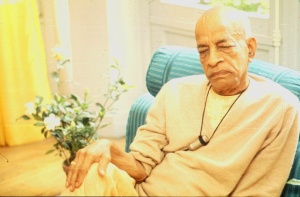SB 11.26.5: Difference between revisions
(Vanibot #0017 edit: indent verse and change id='' to class='' for SB) |
(Vanibot #0054 edit - transform synonyms into clickable links, which search similar occurrences) |
||
| Line 23: | Line 23: | ||
<div class="synonyms"> | <div class="synonyms"> | ||
''[//vanipedia.org/wiki/Special:VaniSearch?s=tyaktvā&tab=syno_o&ds=1 tyaktvā]'' — abandoning; ''[//vanipedia.org/wiki/Special:VaniSearch?s=ātmānam&tab=syno_o&ds=1 ātmānam]'' — him; ''[//vanipedia.org/wiki/Special:VaniSearch?s=vrajantīm&tab=syno_o&ds=1 vrajantīm]'' — going away; ''[//vanipedia.org/wiki/Special:VaniSearch?s=tām&tab=syno_o&ds=1 tām]'' — unto her; ''[//vanipedia.org/wiki/Special:VaniSearch?s=nagnaḥ&tab=syno_o&ds=1 nagnaḥ]'' — being naked; ''[//vanipedia.org/wiki/Special:VaniSearch?s=unmatta&tab=syno_o&ds=1 unmatta]-[//vanipedia.org/wiki/Special:VaniSearch?s=vat&tab=syno_o&ds=1 vat]'' — like a madman; ''[//vanipedia.org/wiki/Special:VaniSearch?s=nṛpaḥ&tab=syno_o&ds=1 nṛpaḥ]'' — the king; ''[//vanipedia.org/wiki/Special:VaniSearch?s=vilapan&tab=syno_o&ds=1 vilapan]'' — crying out; ''[//vanipedia.org/wiki/Special:VaniSearch?s=anvagāt&tab=syno_o&ds=1 anvagāt]'' — followed; ''[//vanipedia.org/wiki/Special:VaniSearch?s=jāye&tab=syno_o&ds=1 jāye]'' — O my wife; ''[//vanipedia.org/wiki/Special:VaniSearch?s=ghore&tab=syno_o&ds=1 ghore]'' — O terrible woman; ''[//vanipedia.org/wiki/Special:VaniSearch?s=tiṣṭha&tab=syno_o&ds=1 tiṣṭha]'' — please stop; ''[//vanipedia.org/wiki/Special:VaniSearch?s=iti&tab=syno_o&ds=1 iti]'' — thus speaking; ''[//vanipedia.org/wiki/Special:VaniSearch?s=viklavaḥ&tab=syno_o&ds=1 viklavaḥ]'' — overwhelmed with distress. | |||
</div> | </div> | ||
Latest revision as of 20:39, 17 February 2024

A.C. Bhaktivedanta Swami Prabhupada
Please note: The synonyms, translation and purport of this verse were composed by disciples of Śrīla Prabhupāda
TEXT 5
- tyaktvātmānaṁ vrayantīṁ tāṁ
- nagna unmatta-van nṛpaḥ
- vilapann anvagāj jāye
- ghore tiṣṭheti viklavaḥ
SYNONYMS
tyaktvā — abandoning; ātmānam — him; vrajantīm — going away; tām — unto her; nagnaḥ — being naked; unmatta-vat — like a madman; nṛpaḥ — the king; vilapan — crying out; anvagāt — followed; jāye — O my wife; ghore — O terrible woman; tiṣṭha — please stop; iti — thus speaking; viklavaḥ — overwhelmed with distress.
Translation and purport composed by disciples of Śrīla Prabhupāda
TRANSLATION
When she was leaving him, even though he was naked he ran after her just like a madman and called out in great distress, "O my wife, O terrible lady! Please stop!"
PURPORT
As his beloved wife was leaving him, the shocked king was crying out, "My dear wife, please think for a moment. Just stop! You terrible lady, can't you stop? Why don't we speak together for a while? Why are you killing me?" Thus lamenting, he followed her.